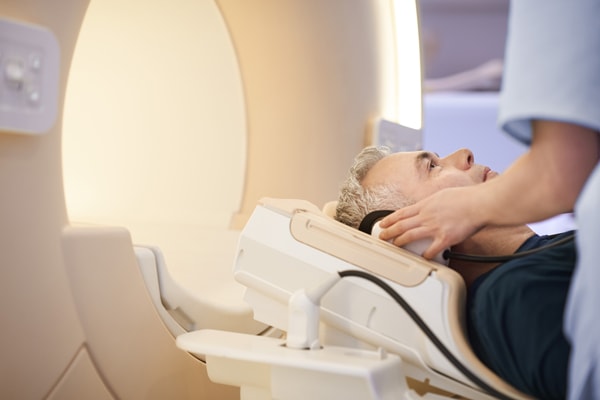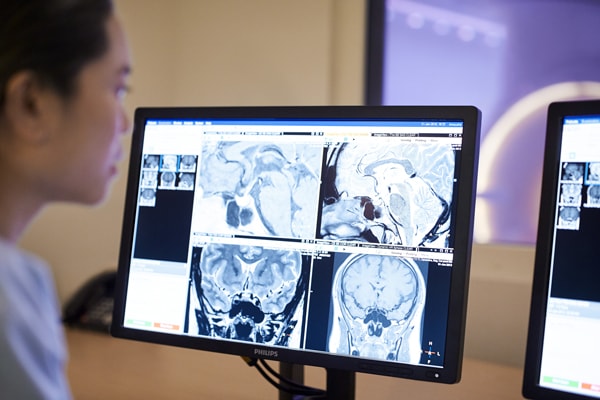MRI
An MRI (magnetic resonance imaging) scan uses a strong magnetic field to form detailed pictures of inside the body and show parts of the body not visible using a traditional X-ray. Soft tissue, fat, cartilage, tendons, bone, internal organs and muscles are well demonstrated by this scan.
An MRI study is often considered the gold standard medical imaging examination for most areas of the body and unlike CT scans or X-rays, MRI doesn’t use radiation.
At Fraser Coast Radiology, we use a 3.0T MRI scanner and can scan all body regions. Our MRI is different to most you find outside of a hospital in that it is “Wide-Bore” (i.e. much wider tunnel) and the time you are required to be in the machine is a lot less. This ensures people of all shapes and sizes can fit into our machine and helps to address some of the issues around claustrophobia.

Booking an MRI Appointment
Given the technology involved in an MRI examination we do make appointments for these studies. Please be patient with us as these studies are a little more complex to book and we need to thoroughly check your history to ensure you are appropriately prepared.
We will require you to send through a copy of your request form in advance (via fax, email to mri@fcradiology.com.au or in person) to ensure your appointment runs as smoothly as possible.
Please note, it is essential you present to reception at the arrival time given to you at the time you make your appointment. Unfortunately, if you are late we may not be able to perform your study and may need to re-schedule your appointment.
How should I prepare?
Prior to your scan you will be asked to complete a MRI Safety questionnaire, this is a critical part of your examination and you should answer all questions to the best of your knowledge. Download, print and complete the MRI Safety Questionnaire. This questionnaire should be emailed/faxed/or delivered in person to our reception staff BEFORE THE DAY of your appointment.
You should let us know:
- if you have a pacemaker, brain aneurysm clips, heart clips, ear implants, cochlear implants or any other implanted devices or prostheses
- if you have any metallic foreign bodies in your body, including shrapnel
- if you have had eye surgery
- if you’re pregnant, or may possibly be pregnant
- if you suffer from claustrophobia.
Most of the time, an MRI doesn’t need any specific preparation. However, an abdominal or bowel MRI may require fasting before your appointment. When you book your appointment, we’ll discuss any preparation needed for your particular procedure.
If you think or know that you may have problems with enclosed spaces (claustrophobia) please contact us prior to your appointment. There are several techniques that we can employ to assist you. In some cases you may wish to be sedated during your examination. You should contact your GP to arrange suitable oral sedation to take prior to your MRI
If you are taking any pain medication please try to time your dose so that its peak action corresponds to your intended scan time. Other medications should be taken as normal.
In certain circumstances it may be necessary for you to receive an IV contrast injection (dye) to improve the accuracy of the diagnosis.
What is a contrast and will it be needed?
A contrast is a liquid that’s either injected intravenously or taken orally before a scan or procedure.
A contrast is sometimes injected before an MRI scan to provide additional information that can help diagnose certain medical conditions. When you make your booking, we can let you know if a contrast is likely to be used for your procedure. The contrast is usually provided as an IV (intravenous) fluid.
What can I expect during the MRI?
Before the scan begins, you’ll be asked to leave items like phones, jewellery, coins, keys, belts and credit cards outside the examination room. The equipment used has a strong magnetic field and could damage your property. Where possible, we suggest that you leave items like this at home.
During your scan, the equipment makes some clicks and noises as the magnetic field changes throughout the examination. These noises are completely normal and for your comfort we will provide you with noise damping ear plugs and head phones.
The MRI technician will position you on a padded table on which you will be placed in the scanner. You will be asked to stay as still as possible for the entire examination.
The technician will operate the equipment from the adjacent room. You will be able to hear and talk with the technician during the examination, but you must not move or change position during the scan. If you do move, the results may not be accurate and the examination may need to be started again or rescheduled.
How long does it take?
Depending on the study requested by your doctor your MRI scan will take between 15 and 60 minutes to complete.
Should I have an MRI if I’m pregnant?
An MRI uses magnetic fields, not radiation, to produce images. Over the last three decades, MRI has been used when necessary during pregnancy without any side effects. Generally, MRI scans are avoided in the first trimester of pregnancy. If an MRI is needed during pregnancy, the use of contrasts will be avoided.
If your doctor refers you for an MRI during your pregnancy, it’s likely that this is the best way for an important or urgent examination to be performed. You should talk to your doctor to find out more about your situation and their recommendation.
Safety Information - Who cannot have an MRI scan?
If you have a pacemaker, clips in the brain, cochlear implants, medical pumps or metal chips in your eyes, you may not be able to have an MRI. If metal chips have been professionally removed you will be safe, however, if we are unsure, we will take an x-ray of your eyes. Most surgical metal implants are safe.
What will it cost?
If you have a current Medicare card and referral form from your health practitioner, you may be able to claim a Medicare rebate. Rebates depend on the type of study requested by your doctor and on the doctor making the request. Please note that your GP has a very limited number of scans that they can request for which Medicare will pay a rebate. If your scan has an out-of-pocket expense, we will let you know when you book your appointment.
When will I get the results?
MRI studies are highly technical and require specially qualified doctors to report on them. As a result, your report may take longer to complete than one for an X-Ray or Ultrasound for example. We will prepare a report for your doctor or health practitioner as soon after your scan as we are able. If your doctor has requested an urgent study we will endeavour to have your report completed on the same day as your examination.
You should not make an appointment with your referring doctor to receive and talk about your test results until you have checked with us regarding their availability.

